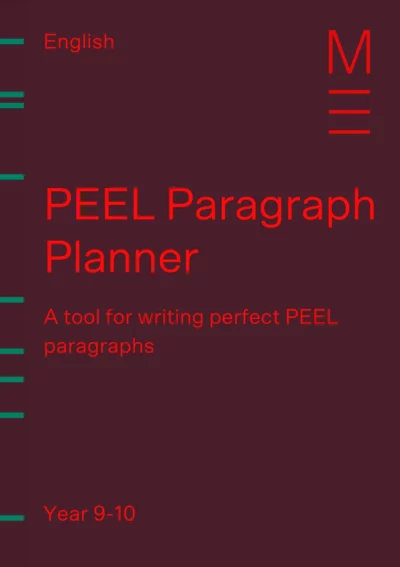Welcome to Matrix Education
To ensure we are showing you the most relevant content, please select your location below.
Select a year to see courses
Learn online or on-campus during the term or school holidays
Learn online or on-campus during the term or school holidays
Learn online or on-campus during the term or school holidays
Learn online or on-campus during the term or school holidays
Learn online or on-campus during the term or school holidays
Learn online or on-campus during the term or school holidays
Learn online or on-campus during the term or school holidays
Get HSC Trial exam ready in just a week
Get HSC exam ready in just a week
Select a year to see available courses
Science guides to help you get ahead
Science guides to help you get ahead

Guide Chapters
Do you know what teachers expect of your writing in Year 9? When students enter Year 9, there’s a change in expectations around students’ responses but it often isn’t made clear. In this article, we will show you the skills for composing English responses in Year 9 that you need to focus on to take your writing to the next level.

Learn to write detailed and insightful paragraphs and score better marks!

Fill out your details below to get this resource emailed to you.
"*" indicates required fields
You might think that composing English responses requires the same skills for every grade. However, that is not true.
As you move higher, you need to continually learn new skills and advance your current composing skills to improve your writing.
Let’s see what they are.
By Year 9, you already know how to compose English responses.
However, you may find that you have been focusing more on the structure and ideas of essays or imaginative responses, rather than the gritty details like effective communication.
This is because you were new to writing essays or creatives, so you had to first learn the basics.
However, now that you know how to compose English responses, the next thing you need to do is to extend your skills and bring your writing to the next level!
Effective communication skills are essential for this. Clarity and concision get marks.
You must be clear and direct when communicating your idea to your reader.
Too often, students waffle and beat around the bush when they write. This makes it harder for readers to understand what you are trying to say.
In Years 7 and 8 English, you might find that your ideas and arguments are quite simple. Although it is okay for Stage 4 English, it is not enough to get you good marks in Year 9 English.
It is important that you are always thinking, reading and researching to expand your knowledge. This way, you can develop more complex ideas when you compose English responses in Year 9.
In Stage 4, you were taught to structure essays like this:
Although this is correct, it is a very simple understanding of essays.
To get good marks in Year 9, you need to know how to structure these ideas to make your essays stronger and more convincing.
This means that your ideas are not only put in a hierarchical order, but it is has to logically flow from one another.
You can skip to the section on structuring ideas to see how we can do this.

Analysing requires you to unpack your text rather than just describing what happens.
This means that you need to consider the whole text and see how the composer uses techniques, style and form to create meaning.
If you want help with analysis, read part two of this Guide on TEXTUAL ANALYSIS.
In the early years of High School, students tend to briefly analyse their examples, discuss weak or irrelevant evidence, or forget to link their analysis to their thesis when they compose English responses.
However, you need to drop these habits in Year 9 English because you cannot get good marks from it.
Year 9 English requires you to look more deeply into texts and compose stronger responses. We will go through the steps for connecting your analysis to your argument further in the article.
Transitioning is when you connect different sections of writing to make it read smoothly and flow from each other. This can be between sentences or even paragraphs.
When students forget to transition their paragraphs or sentences, their essays become choppy and hard to understand.
In Year 9, you are expected to produce a well-structured essay. This means an essay that is structured correctly and is also smooth and progressive.
This is why transitioning is so important in essays.
Your sentences, ideas and argument will flow from each other… which makes your English responses a lot easier to read and understand!
We will go through how you can transition in your essays later in this the article.
A sustained argument is an argument that is carried out throughout a whole essay.
In Years 7 and 8, students tend to write and write about their text… but their ideas don’t relate to their thesis, or they forget to link their analysis to the thesis, topic sentence or question.
This is not a sustained argument.
In Year 9 English, you are expected to be able to sustain your argument throughout your whole English response.
So, it is very important that you start paying attention to what you are writing.
We discuss how you can sustain your argument later in this article.
In this section, we will give you the steps to learn and improve your writing skills for Year 9 English.
Communication is a transmission of ideas between two or more people.
Basically, there is a sender and a receiver (or receivers). The sender is the person who sends the information and receivers are those who interprets and understands the message.
When you compose English responses, you are the sender.
It is your job to make sure that your message is clear and direct.
This way, the receiver understands exactly what you’re saying and accept it. A good writer does the work for the reader.
So, how exactly do we do this?
Here are 5 simple rules you must follow:
Let’s unpack these ideas a little more.
Long and sophisticated sentences just make it harder for readers to understand what you are saying. If you have to take a breath when you read the sentence, then it is too long! Keep your sentences short, simple, and readable.
Too often, students think that fancy words make their writing fancy. But it’s actually the opposite. Students tend to misuse these words because they don’t fully understand it. Instead, just use simple words to effectively communicate your meaning. Your ideas should be complex, not your words.
Students often like to write everything they know about the topic to show off their knowledge. Don’t fall into this trap. This isn’t communicating effectively.
Instead, only write about the things that are important and necessary to the question you are answering.
When composing English responses, students forget to fully explain things because they assume that the readers know exactly what they’re talking about. But readers are not mind readers! Make sure you clearly explain everything the reader needs to know… even if you have to write another sentence for it.
Active voices begin with the subject, then the verb and object. Whereas, passive voices start with the object, verb then subject.
Here is an example, “John wanted to skydive” vs “Skydiving is what John wanted to do“.
As you can see, sentences in active voices are easier to read and convey the message much more clearly.
In Year 9, there are two main things that you need to focus on when it comes to ideas in your essay. They are:
It might seem like a lot to think about, but it is actually not that difficult!
Let’s see how.
To create more complex ideas and arguments, you need to:
This includes newspapers, journals, articles, books etc. When you read a variety of different things, you see different perspectives about situations, events and ideas. This will help you develop more complex and interesting ideas when you compose your English responses.
When you plan, you are giving yourself time to think about different ways to approach an essay. This means that you can explore the text and its concepts more deeply to find complex arguments for your English responses.
Research about the topic you want to talk about or the ideas you want to explore. This way, you have a better understanding of what you will write, which will make your ideas seem stronger and more complex.
To structure your ideas, you need to:
This means that you need to put the most important ideas first, then the second most important etc.
Your essay should slowly lead the reader to your desired destination. This means that you arguments should all be linked to each other.
Don’t just write three totally different and unrelated arguments because there is no progression. Try to always find a point of connection between the arguments, even if the common point is the thesis!
Your ideas should flow from each other instead of being listed!
If two of your paragraphs have very similar ideas, there will always be overlapping information. This will make your English responses weaker. Instead, just group similar ideas together and find another argument to write about.

Remember, analysing is not just simply describing what happens and saying what that means.
Analysing is the process of unpacking the text and seeing how it conveys meaning through techniques and form.
Year 9 English requires you to:
Don’t just recount what is happening in the text. This means that you need to look for techniques and see how it creates meaning.
Too often, students use quotes as their evidence instead of techniques. In Year 9, you need to find techniques and analyse them, instead finding good quotes. Quotes are not techniques.
Students tend to use the first technique they find, because ‘it takes too long to look for more‘. However, it is crucial that your techniques not only support your argument, but are also higher order. This means that they are more effective at creating meaning.
For example, a metaphor is a higher order technique, whereas repetition isn’t.
Don’t just identify the technique without context. Instead, you have to briefly describe what is happening in the text when the technique is used. Do not merely identify page or line numbers.
Too often, students analyse their evidence and forget to relate it back to their thesis/topic sentence.
You must always link your analysis to your argument!
This will ensure that all your evidence connect together and your argument is sustained. This also shows that you are answering the question.
Search for deeper themes and ideas in the text. Then, link it to what is happening in the world.
Transitions connect ideas and demonstrate heirarchy and logic.
There are two types of transitioning that you can do: between sentences or between paragraphs.
Sentences
Within a paragraph, you may go over a series of smaller ideas that support your argument. Using transitional words will slowly lead your reader through your train of thought.
For example, “The witches’ prophecy in the opening, foreshadows Macbeth becoming King in ‘All Hail Macbeth, that shalt be king hereafter’. However, Macbeth is unable to maintain this position because of his growing guilt, symbolised by the ghosts that haunts him in his sleep.”
Paragraphs
When you start a new paragraph, it is a good idea to use transitional words to make your argument flow from each other.
For example, “Additionally, Shakespeare explores the lust for power in ‘Macbeth’…”
Here are some common transition terms that you can use:
Why use the word | Transitional words |
| To add an idea | Additionally, also, furthermore, moreover, in addition |
| To introduce a similar idea | Similarly, likewise, also |
| To introduce a contrasting idea | However, on the other hand, yet, nevertheless, in spite of |
| To give an example | For example, for instance, as illustrated |
| To show cause and effect | Therefore, consequently, so, thus, subsequently |
| To emphasise | In fact, indeed, |
However, it is important that you don’t overuse transition words in your essay.
As we discussed earlier, your arguments need to relate to one another to make the essay flow.
You can’t force two unrelated ideas together with a transition word. Your essay will seem badly written.

Sustaining arguments is about carrying out the same argument throughout your whole response.
This shows that you are properly answering the question and are not waffling about irrelevant information.
So, how do we sustain our arguments?
Follow these two steps:
As we mentioned earlier in the article, it is important that your arguments connect to one another.
When you have a series of arguments that progress from the thesis, this will ensure that you are sustaining one main argument throughout your whole essay.
Signposting is when you use the keywords from your question/thesis throughout your response.
Signposting guides readers through your writing.
This is one way to ensure that you are sustaining your argument because you are forced to relate your analysis back to your question/thesis. Signposting also ensures that you aren’t writing unrelated information. When you signpost, you explicitly show readers that you are answering your question.
Knowing what’s expected of your English responses in year 9 is only half of the battle. You need to write them, too.
We’ve covered the skills you need, but you need to write a variety of different types of responses.
In the following articles, we will show you how to write everything from persuasive essays to creatives with detailed explanations and step-by-step processes.
Let’s get started.
© Matrix Education and www.matrix.edu.au, 2025. Unauthorised use and/or duplication of this material without express and written permission from this site’s author and/or owner is strictly prohibited. Excerpts and links may be used, provided that full and clear credit is given to Matrix Education and www.matrix.edu.au with appropriate and specific direction to the original content.